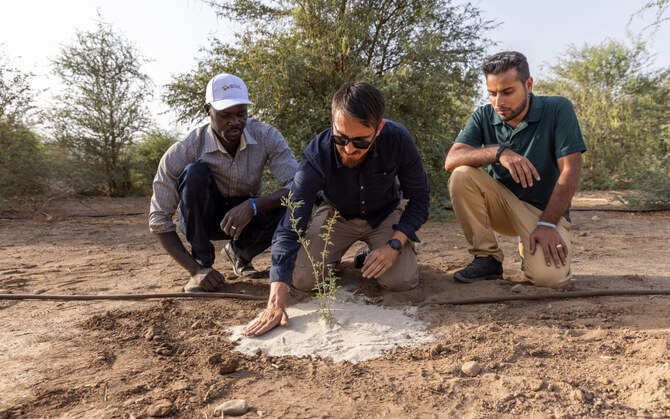JEDDAH: For more than a decade Saudi Arabia has invested in sustainability, implementing groundbreaking initiatives to combat desertification, improve soil quality and preserve water.
These efforts are transforming the Kingdom’s landscape, aligning with the broader goals of the Saudi Green Initiative.
One of the most ambitious projects is King Salman Park in Riyadh — one of the world’s largest urban parks. The initiative focuses on increasing green spaces, restoring soil health and mitigating the urban heat island effect.

Native tree planting and sustainable water management systems are key components, ensuring long-term environmental benefits.
Meanwhile, on the Kingdom’s east coast, Saudi Aramco has spearheaded efforts to manage soil erosion, improve water retention and enhance biodiversity.
But it is in the laboratories of King Abdullah University of Science and Technology where cutting-edge technology is shaping the future of sustainable soil solutions.

Terraxy technology in the lab. (KAUST photo)
Himanshu Mishra, an associate professor at KAUST, has spent the last decade addressing some of Saudi Arabia’s biggest environmental challenges. A specialist in water properties, his early research led him to an eye-opening realization about the Kingdom’s water usage.
“When I came to Saudi Arabia, I learned about the stress on water,” Mishra told Arab News. “Somebody told me that 80 percent of Saudi Arabia’s water is used for food production, yet (the country) is importing most of its food. That just blew my mind. I was disturbed by it.”
Opinion
This section contains relevant reference points, placed in (Opinion field)
Inspired by nature’s ability to repel water, Mishra co-founded SandX, a biodegradable, water-repellent sand coating designed to reduce water evaporation.
The technology mimics nature’s super water-repellent surfaces — like butterfly wings and bird feathers — to create a revolutionary material.
“This material, it hates water. It absolutely hates water,” said Mishra. “This is SandX, and water doesn’t penetrate it.

Screen grab from a video showing KAUST researchers applying Carbosoil at a SandX testing site. (KAUST video)
Each grain of SandX is coated with a nanoscale layer of biodegradable paraffin wax, reducing water evaporation by over 80 percent without the use of plastics. “Bacteria will eat the wax, so SandX will become sand again,” Mishra said.
“No one has ever done this in Saudi Arabia. We are the engineers, the first ones to do that. We are pioneers in this.”
Water scarcity, however, is only part of the challenge. “Do you know how old this water is?” Mishra asked, holding up a bottle. “This water is older than our planet. We have limited water resources, but we still have some resources. What we don’t have (are) fertile soils.”

Himanshu Mishra. (Supplied)
Green spaces in Saudi Arabia are heavily dependent on imported peat moss, he said, a practice that is not only expensive but also counterproductive to sustainability.
“You import so much peat moss every year — it’s a multi-million-dollar market. And you rely on these imports. It defeats the whole purpose of sustainability.”
To address this, Mishra developed CarboSoil, a groundbreaking soil amendment and carbon capture technology derived from organic waste.

A layer of SandX applied like mulch over wet soil greatly reduces evaporation. (KAUST/Terraxy photo)
Unlike traditional compost, which eventually releases carbon back into the air, CarboSoil locks carbon into the soil while enhancing plant growth.
“This is the only technology known to humanity that does soil amendment and carbon capture at the same time,” he said.
Field trials for CarboSoil are ongoing, with production scaling up following a KAUST Innovation and Economic Development grant. Mishra believes the impact will be transformative.
“Our technology will contribute to food production and greening projects in arid regions,” he said. “When you apply it on plants, they grow bigger and stronger — like 60 percent bigger, with wider trunks. Enhanced food production. Enhanced yields. That’s additional carbon capture.”

Oil palm waste. (Getty Images)
Looking ahead, Mishra envisions Saudi Arabia leading the world in carbon dioxide removal.
“I can guarantee you that as we continue to scale up this production under the stewardship of the Ministry of Environment, Water, and Agriculture, in less than five years, Saudi Arabia will be ranked number one in carbon dioxide removal deliveries on the planet.”
The startup’s ambitions extend far beyond the Kingdom. “Right now, our goal is to contribute to the landscaping and green sector in the Kingdom,” he said.
“In phase three, we start building factories for poultry farms, date farms, and other industries. Phase four is we will expand to the wider Middle East.”



























